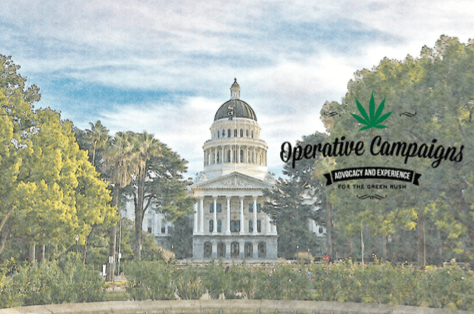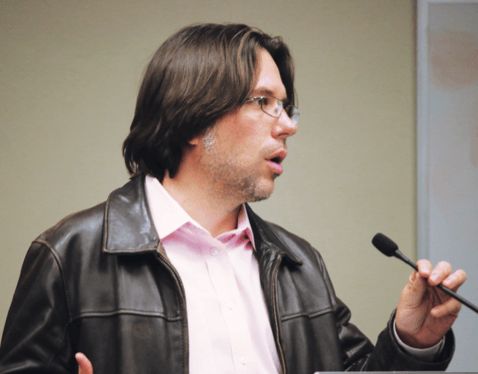Sean Donahoe explains the challenges of organizing the Golden State, and why Prop 64 will pass.
Finding a definitive label for Sean Donahoe is a fruitless, if enjoyable, endeavor. Educated at the University of California at Santa Cruz and the London School of Economics and Political Science, the policy wonk and business strategist not only has been an active and effective participant in California cannabis politics at the local and state levels, but also wears many other hats as an advisor and mentor to businesses, municipalities, and trade associations in the state and beyond. Donahoe also is the president of Operative Campaigns, which he founded in 2014 to provide clients with strategic guidance, business development, legislative and local governmental relations, political campaigns, and public relations. A grounded professional with a broad perspective about the industry and the governments tasked with regulating it, his predictions are both cautious and hopeful.
When and why did you become involved with the cannabis industry?
My previous fields were academia and political consulting, and near the end of 2012 I was asked to assist on two projects where my skills were needed to better organize the cannabis industry here in California. I had been somewhat close to the campaign staff of Proposition 19 in 2010 and had very much tracked the recent elections in Colorado and Washington.
My work on congressional races, local races, and advocacy campaigns was fulfilling, but none of those offered the degree of fulfillment and challenge the cannabis industry offered then and now. Every day, I appreciate being able to be a part of this industry during this crucial period.
One of your bios describes you as a “subject-matter specialist for the industry, assisting in the navigation of state and local politics.” Is that still an apt definition? What does it mean in terms of what you have done and continue to do?
I have spoken at many conferences and talks, so my bios do seem to proliferate and get repurposed or reworked by others—but that would absolutely be an accurate assessment of some of what I do. In short, my background in policy analysis and political consulting allows me to approach business goals within the cannabis industry from a unique perspective. My clients benefit from guidance on their business strategies, which allows them to adapt to new regulatory and compliance scenarios. I also help them with the strategic deployment of governmental relations services—often seen as lobbying—at the state and local levels and the development of new business opportunities from license acquisition to vendor introductions to real estate or brand development. In addition, I serve the 750-plus membership of the California Growers Association as an advisor for local politics and electoral affairs.

I have been lucky enough to have met great, enthusiastic partners in the cannabis industry over the past several years. The thirst to connect, network, and collaborate within the California cannabis industry never ceases to amaze me, and the ability for the industry to adapt around “bad apples” via just moving a positive agenda forward gives me hope for the years ahead.
In relation to my efforts, I am proud to have co-founded CCIA and guided its growth during the formative first years, and to assist the statewide growth of California Growers Association. From mentoring startups to drafting the City of Oakland’s ordinances, there are so many compelling projects and clients constantly vying for the scarce hours in the day. In the end, though, in order for me to work on something it has to have a special resonance with me—an opportunity to work with righteous folks or a phenomenal brand, for example.
What is the general state of regulatory readiness among cannabis businesses in the state? Do you see any lingering resistance to a comprehensive regulatory regime?
The state of regulatory readiness is constantly improving. To be honest, what I’ve found so encouraging is that there is often a very high level of familiarity with the coming state regulatory framework. Granted, I do see a skewed perspective of the industry as I have been so involved with the more proactive operators—those folks who see the wisdom of joining trade associations, establishing their presence at city council meetings, and learning to lobby at the state level. What resistance I do continue to hear, and which continues to be a division within the industry, is primarily on the third-party-distributor requirement compelled by the framework of the Medical Cannabis Regulation and Safety Act (MCRSA) at the insistence of various Sacramento legislative stakeholders.
As the election nears, are municipalities becoming more or less open to crafting cannabis regulations? What are the most common sticking points with cities and towns?
Where we are now with localities in California is the implementation of MCRSA. Few places are developing local ordinances and issuing local permits, licenses, or other forms of authorization. The most common frustration I continue to have at the local level is the degree of residual misinformation and dated notions attached to cannabis. Word hasn’t trickled down to city council members and county supervisors that the concerns and complicated policy issues were discussed a year ago by their representatives in Sacramento.
Having to re-educate, at the local level, about the license types and details of the industry has been tedious, but regulation is a deliberative process, not an immediate epiphany.
In the end, you can lead localities to water, but you can’t make them drink from the trough of opportunity the cannabis industry offers. The conversation all too often comes down to taxes and revenues, but occasionally dips into more constructive areas of job creation and indirect economic development. In very few situations, I have found latent support for an ordinance in the most seemingly unlikely of jurisdictions, but you never know when an elected official may have a personal experience with the efficacy of medical cannabis and can testify to their colleagues about its effects. Do be helpful, do be constructive, don’t be arrogant, don’t be combative, etc.
Let’s talk Prop. 64. Did you have a role in crafting Proposition 64? What is your opinion overall, and what do you think are the ballot measure’s greatest strengths and weaknesses?
I have been very involved in drafting, commenting on, negotiating the contents of, and performing outreach on statewide ballot measure efforts since the fall of 2013. There was a brief thought by some to attempt a run at legalizing on the 2014 ballot in California, but the wise move was to wait until the 2016 presidential ballot.
The effort to craft the Adult Use Marijuana Act (AUMA, aka Prop 64), included the national organizations Drug Policy Alliance, Marijuana Policy Project, and New Approach PAC. The more grassroots Coalition for Cannabis Policy Reform hosted multiple briefings, town hall meetings, and roadshows. My direct role was with the latter organization, serving on the executive committee and as legislative co-chair, but I advised the national organizations throughout and maintain good relations with the campaign organization. I remain excited about the voters of California finally getting their chance to weigh in and move adult use cannabis policy forward.
Do you believe AUMA will be approved by voters? If so, after the initial celebration, what will the following six months look like in terms of implementation and acceptance? Will more cities become receptive to cannabis? Will more companies seek your services?
It’s my firm belief that California on November 8 is going to follow in the footsteps of other states and pass Proposition 64. Knowing campaigns and having some understanding of political psychology, I think it’s going to come down to a reductionist urge on the part of voters not to be left behind. As other states have moved forward, there’s a degree of groupthink and irredentism that makes “legalization” an obvious move.
Californians understand cannabis is relatively benign and yet could be better regulated, but no one knows what, exactly, the framework will look like. From what I’ve seen, elected officials and staff of cities and counties, on the other hand, often are living in the past despite being told over and over again there is a comprehensive regulatory framework available to them to adopt. I have heard from many jurisdictions that they are waiting to move forward on implementation of MCRSA until they see the results of Prop 64, which is intellectually frustrating but politically rational.
Lastly, I plan to be very busy for years to come.
What is your vision for the industry, and how optimistic are you that it can be achieved? What are the biggest challenges facing the industry in the coming years?
My vision for the industry primarily revolves around the development of California as the hub of responsible and reasonable regulation; the hub of an agricultural- and sustainability-driven understanding of cannabis cultivation. California is the largest consumption market in the world and home to the originators of global cannabis brands. It should be easy to knock out those goals.
Challenges that still exist are the industry coming to terms with the carbon footprint and water usage of cultivation operations and the cultural clash that will occur as retail storefronts begin making their way to the suburbs. The big lift yet to come, however, is regulation of manufacturing at the federal level, which will occupy us well into the future.
Any last-minute message you want to send to industry stakeholders?
Depends on where you are, but generally you should help statewide campaigns and local ballot measures. Also, assist your local or legislative elected officials who are aligned with cannabis policy reform. Attend a fundraiser, chip in a few bucks, and make your presence felt as a responsible and politically engaged representative of the cannabis industry.
Politics often comes down to who shows up, who forms a relationship of mutual admiration, and who can make a relatively articulate case to advance their business interests. November 8 will be a big day to push back against cannabis prohibition, but the path toward reasonable regulation will extend long into the future. It is important to have the right organizations and allies in place.











